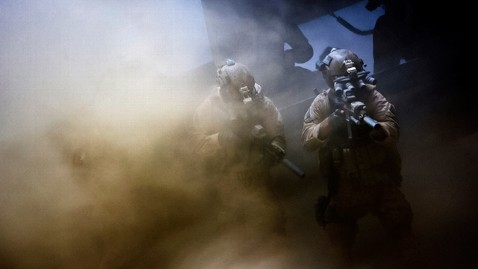
Navy SEALs are seen fighting through a dust storm in the new thriller directed by Kathryn Bigelow, "Zero Dark Thirty." (Columbia Pictures/AP Photo)
There’s only one White House staffer portrayed in the new movie “Zero Dark Thirty,” and it is someone described in the credits as “National Security Advisor.”
It’s a position that’s possibly filled in real life by John Brennan, the president’s counterterrorism advisor, who President Obama nominated Jan. 7 to be director of C.I.A.. The character in the movie, with references to the C.I.A’s involvement in the flawed intelligence on weapons of mass destruction that led the U.S. into war in Iraq, explains to a frustrated agency representative the difficulty of the president’s decision in acting on partial intelligence.
Spoiler alert: The president does ultimately act on that partial intelligence and Osama bin Laden is nabbed.
The character in real life – Brennan – has been opposed by some for his work at the C.I.A. under President Bush and the “enhanced interrogation” policies like waterboarding that also play a prominent role in the movie.
President Obama makes a cameo in the movie in the form of a “60 Minutes” interview in which he declares that, “America doesn’t torture, and I’m gonna make sure that we don’t torture.”
That declaration is viewed, in the film, by a table full of CIA agents in Pakistan who have been involved in “enhanced” interrogations.
The U.S. used waterboarding on three al Qaeda detainees at secret prisons run by the CIA. It ended the practice of using secret prisons in September of 2006 under President Bush and in 2009 President Obama signed executive orders in his first days in office that banned of the use of waterboarding and other “enhanced interrogation” techniques.
But that was after the techniques had already scuttled Brennan’s first chance to head the CIA. Brennan wasn’t nominated to be CIA director back in the early days of the Obama administration, but he was widely considered to be a front-runner for the job. ABC’s Jake Tapper reported at the time that Brennan withdrew his name for consideration and most of the opposition came as a result of his work at the C.I.A. when those techniques were in use.
And there is indication that they will make his nomination difficult this year.
“I appreciate John Brennan’s long record of service to our nation, but I have many questions and concerns about his nomination to be Director of the Central Intelligence Agency, especially what role he played in the so-called enhanced interrogation programs while serving at the CIA during the last administration, as well as his public defense of those programs,” said Sen. John McCain after Brennan was nominated Monday. ”I plan to examine this aspect of Mr. Brennan’s record very closely as I consider his nomination.”
The movie has certainly brought “enhanced interrogation” – it’s critics call it torture – back into the conversation about the war on terror, as ABC’s Lee Ferran reported Monday:
Last week three high-powered senators, Intelligence Committee Chairman Dianne Feinstein (D.-Calif.), Armed Services Committee Chairman Carl Levin (D.-Mich.) and 2008 Presidential candidate John McCain (R.-Ariz.), revealed they had written two letters to Morell in December demanding to know what impact the CIA may have had on the depiction of enhanced interrogation in the film and whether the agency “misled” the filmmakers into thinking the tactic was effective.
“As you know, the film depicts CIA officers repeatedly torturing detainees. The film then credits CIA detainees subjected to coercive interrogation techniques as providing critical lead information on the courier that led to the [bin Laden] compound,” one letter says. “The CIA cannot be held accountable for how the Agency and its activities are portrayed in film, but we are nonetheless concerned, given the CIA’s cooperation with the filmmakers and the narrative’s consistency with past public misstatements by former senior CIA officials, that the filmmakers could have been misled by information they were provided by the CIA.”
Brennan, for his part, has said he opposed torture techniques, as Jake Tapper reported back in 2008 when Brennan removed his name from consideration for the C.I.A. job in 2008.
In a letter released to the media, apparently by Brennan or someone operating on Brennan’s behalf, the former CIA official wrote, “It has been immaterial to the critics that I have been a strong opponent of many of the policies of the Bush Administration such as the preemptive war in Iraq and coercive interrogation tactics, too include waterboarding. The fact that I was not involved in the decision making process for any of these controversial policies and actions has been ignored. Indeed, my criticism of these policies within government circles why I was twice considered for more senior-level positions in the current Administration only to be rebuffed by the White House.”
But Brennan did defend the practice in news media interviews when he described the actions of C.I.A. director George Tenet. This is what Brennan told CBS’s Harry Smith about enhanced interrogation in 2007: “The CIA has acknowledged that it has detained about 100 terrorists since 9/11, and about a third of them have been subjected to what the CIA refers to as enhanced interrogation tactics, and only a small proportion of those have in fact been subjected to the most serious types of enhanced procedures….There have been a lot of information that has come out from these interrogation procedures that the agency has in fact used against the real hard-core terrorists. It has saved lives. And let’s not forget, these are hardened terrorists who have been responsible for 9/11, who have shown no remorse at all for the deaths of 3,000 innocents.”
Brennan has also spoken out in support of “rendition” – the practice where the U.S. government captures terror suspects in one country and relocates them to another. That’s a practice still employed by the Obama administration, according to a recent Washington Post investigation.
Related: Watch Martha Raddatz’s Nightline interview with ‘Zero Dark Thirty’ Director Kathryn Bigelow:













